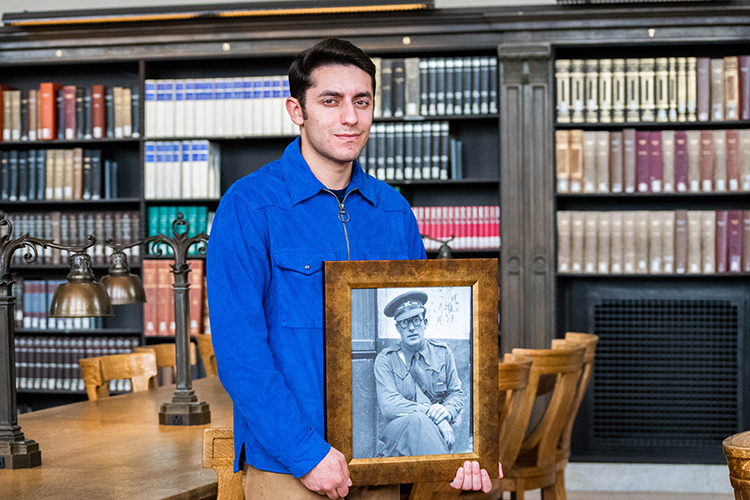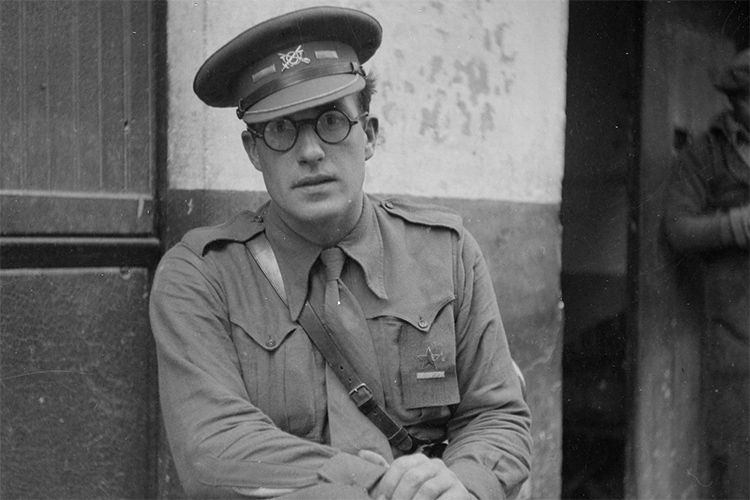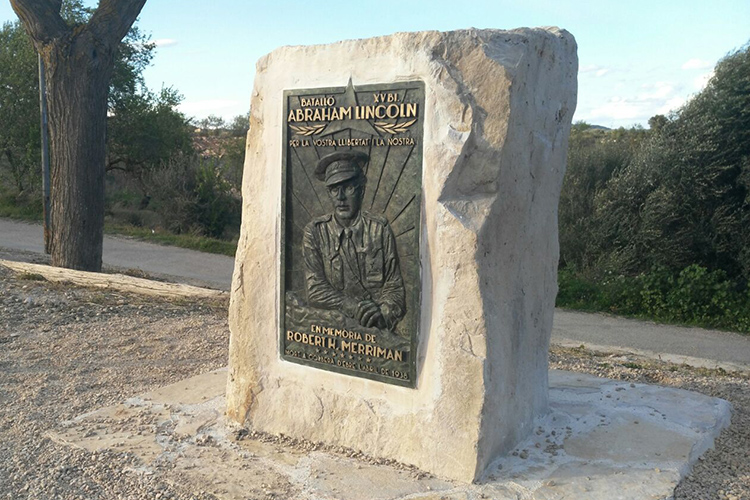Student honors 1930s anti-fascist war hero, ‘the best of us’
Young alum Robert Merriman died as a Spanish Civil War volunteer
August 21, 2019

Milton Zerman, a history major, holds a photo of Robert Merriman, a Berkeley Ph.D. student who volunteered for and died in the Spanish Civil War (1936-1939). (UC Berkeley photo by Irene Yi)
UC Berkeley undergraduate Milton Zerman never met Robert Merriman, a Ph.D. student on campus more than 85 years ago. But after learning about him in “The History of Fascism,” a class Zerman took this summer, the senior won’t forget him — and has a plan so no one else in Berkeley will, either.
Merriman was one of at least 10 Berkeley students from diverse academic fields and racial backgrounds — and some 2,800 U.S. citizens — who voluntarily fought in the 1936-1939 Spanish Civil War to defend the Spanish government against rebels backed by Nazi Germany and Fascist Italy. At the time, American public sentiment favored maintaining strict neutrality in European conflicts.
One of Ernest Hemingway’s inspirations for the character of Robert Jordan, an American anti-fascist hero in For Whom the Bell Tolls, Merriman was killed in April 1938, at age 28, while one of the highest-ranking American volunteers who fought in Spain.
“He was a young, idealistic Californian who believed in American and democratic values and in freedom and equality — and he put his life on the line for them,” says Zerman, a history major who’s successfully raising funds for a plaque to memorialize Merriman. He says his plan to place it outside the Virginia Street apartment building in Berkeley where Merriman and his wife, Marion, once lived got an “enthusiastic” response from the property owner.
Zerman’s summer course instructor, Alexis Herr, says one of the books she required her students to read, Spain in Our Hearts: Americans in the Spanish Civil War, 1936-1939, by Adam Hochschild, sparked Zerman’s interest in Merriman. For his 2016 non-fiction book, Hochschild, a lecturer at Berkeley’s Graduate School of Journalism, profiled Merriman and several other American Spanish Civil War volunteers who joined the multinational International Brigades.
“The book lit up his imagination — those stories resonate with people. It’s a poignant book for students who are trying to figure out their voices and their responsibilities to the world,” says Herr, a genocide historian. “It’s about emotions and ideas, and how they capture people.”
Hochschild says he’s delighted the class read his book and explored fascism, as “it’s something we need to be concerned about today, when, all over the world, there is a resurgence of the kind of strongman, authoritarian, nationalist politics that were so toxic in the 1930s.”

Former UC Berkeley Ph.D. student Robert Hale Merriman joined the volunteer International Brigades in 1936 to defend the democratically-elected Spanish government. He is believed to either have died in battle or to have been executed by the right-wing forces of Gen. Francisco Franco on April 2, 1938, in Corbera d’Ebre, Spain. His body was never found. (Photo courtesy of the Abraham Lincoln Brigade Archives)
Merriman ‘represents the best of us’
At 21, Zerman is younger than Merriman was at Berkeley, but there are parallels between the two. Both grew up in California — Zerman in Los Angeles and Merriman in Santa Cruz. Both wound up at Berkeley after attending college elsewhere. Zerman transferred from Los Angeles Valley College, and Merriman got his undergraduate degree at the University of Nevada, Reno.
Both were smitten by the campus.
“It was always my dream to go to Berkeley,” says Zerman. “But I didn’t get in right out of high school. My friends went, and I visited them a lot, and I fell in love with the campus and the city, … There’s so much to get involved in — everyone’s passionate about something. And it’s the oldest of the UC campuses, and every corner of it has history.”
A favorite spot for Zerman is the Morrison Library, also one of Merriman’s hangouts. The reading room “is like a handsome club room of some sort. Soft armchairs and all,” Merriman, a doctoral student in economics, wrote to his wife, when she was still living in Nevada, where they’d met.
The two young men also had military training. Merriman joined the ROTC in college, and Zerman, while in community college, joined the California State Guard — formerly the California State Military Reserve. A branch of the National Guard, it provides the state with the trained military support of volunteers in the event of state security or natural disaster emergencies.
“I also have a family history involving the military,” adds Zerman. “My grandfather, Milton E. Zerman, fought in World War II against the fascist governments in Europe under Gen. George S. Patton and was promoted to captain. He’d been in the ROTC at the University of Michigan.”
But that’s where the similarities end, says Zerman, who puts Merriman on a pedestal, as he “represents what we should all aspire to.”
“In a world full of appeasers and isolationists,” Zerman explains, “he bucked conformity to fight for what is right, even if it meant putting his own life and reputation on the line. He represents the best of us, as Berkeley students and as American citizens. We should always strive for that level of courage and personal initiative.”

Marion Merriman (center) met her husband (right) when they were undergraduates at the University of Nevada, Reno. When Robert Merriman entered graduate school at UC Berkeley, they moved into a $20-a-month Berkeley apartment where current student Milton Zerman hopes to install a plaque honoring the well-known alumnus. On the left is Dave Doran, who fought — and perished — alongside Robert Merriman in the Spanish Civil War. (Photo courtesy of Abraham Lincoln Brigade Archives)
Missing body, muddy details
The late California historian Kevin Starr agreed, writing this about Merriman: “Because he was so talented, and because he died so young, and because Hemingway immortalized him, Merriman must be given the first position in any roll call of Californians” who fought against fascism.
At the end of 1934, after completing his coursework at Berkeley, Merriman traveled to Russia to do research for his doctoral thesis on Soviet agriculture. Then, the war broke out in Spain, with Gen. Francisco Franco leading an assault to take over the country’s democratically-elected government, which unsuccessfully begged the United States, Britain and France to sell it arms.
More than 40,000 men from 53 countries volunteered to help, and Merriman, with his ROTC training in Nevada and as a reserve lieutenant in the U.S. Army, quickly was appointed combat commander of the Abraham Lincoln Battalion, a group of U.S. soldiers, technicians and medical personnel. He led it into battle in February 1937.
Merriman became badly wounded, but after several months, returned to the war — this time as chief of staff of the XV International Brigade — to lead the fight to capture Belchite, a Spanish town where the tall, strong, amiable and revered commander drew the attention of Hemingway, who covered the Spanish Civil War for the North American Newspaper Alliance.
But on April 2, 1938, Merriman went missing in the Ebro Valley during a chaotic retreat from Franco’s troops; his body has never been found. Hochschild, in his book, details varying accounts of Merriman’s death. Some say Merriman was held in a prison camp, others that he was captured and executed. UC President Robert Gordon Sproul and more than 100 UC professors wrote to then-U.S. Secretary of State Cordell Hull to ask for help determining his fate.
Franco’s forces won the war in 1939. Merriman’s wife visited Spain three times to look in vain for the place where her husband disappeared. Hochschild writes that Marion Merriman received a letter in 1987, 49 years after her husband’s death, from a Spaniard, Fausto Villar, claiming he was in Merriman’s battalion and had seen him “fall dead at my side” as enemy machine-gunners opened fire.

Last year, researchers from the University of Catalonia installed this monument in the Spanish village of Corbera d’Ebre, at the site where Robert Merriman is believed to have been killed. (Photo by Joan Antonio)
A plaque for future generations
This summer, Herr’s class conversed with author Hochschild via Skype, and the topic of the Merrimans’ former apartment in Berkeley arose. Zerman decided to try to find it by consulting the UC Berkeley 1932-1933 Register of the Academic Year, where it was listed at 2517 Virginia Street, as well as Marion Merriman’s biography of her husband, “An American Commander in Spain: Robert Hale Merriman and the Abraham Lincoln Brigade.”
“She also mentions that address,” says Zerman, “and talks about a physical description of the two-story house with bay windows.” Zerman found it, adding that “it perfectly matched the description.”
The Alameda County Historical Society sent Zerman a link to an e-plaque for Merriman that’s on the Berkeley Historical Plaque Project’s website — Zerman says he discovered it had the wrong address for Merriman’s apartment, and it was corrected.
Hochschild says he recalls feeling “a sudden, special connection” to Merriman, too, after learning that Merriman once lived on the same side of Virginia Street and only three blocks away from where Hochschild and his wife, Berkeley emerita professor of sociology Arlie Hochschild, would start raising their family 30 years later.
“And, as it happens,” Hochschild adds, “we’re back in the same neighborhood today, a few blocks in the other direction. The Merrimans also lived two years in Moscow, where I have also lived, to research a book.
“And, I’m absolutely delighted that Milton Zerman has taken the initiative to honor and remember this man from our campus who gave his life fighting fascism in Spain.”
Zerman hopes the plaque — he’s nearing his fundraising goal of $1,000 — will help educate others on campus and in the city about Merriman, his convictions and his bravery.
“Merriman is a unifying figure for the campus. He was a conservative that stood up for American values, but also idealistic and liberal,” says Zerman. “It would be so awesome to have a memorial to him, so future generations will learn the history behind it.”
Next, he says, he’d like to work with the campus to create a memorial to all the Berkeley students who fought in the Spanish Civil War.
“We already have monuments on campus to students who served in World War I and World War II, as well as in other wars,” that include California Memorial Stadium and Memorial Glade, he says, “so I think it could be a suitable addition.”